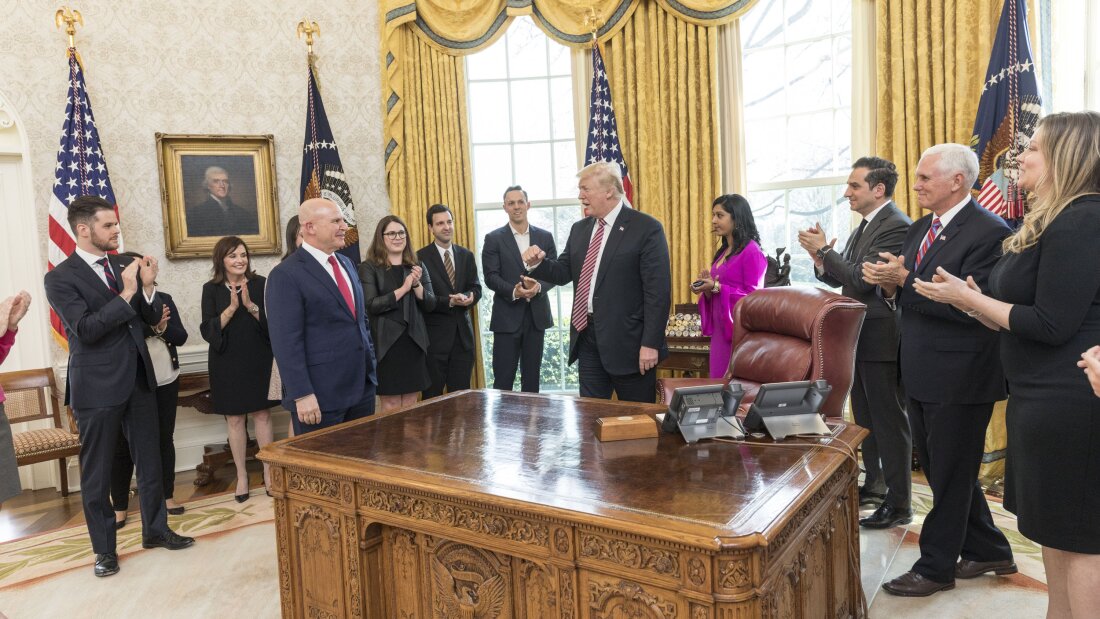
Former Nationwide Safety Adviser H.R. McMaster receives a send-off from the White Home employees on his final day within the Trump administration on April 6, 2018.
Courtesy of the creator.
conceal caption
toggle caption
Courtesy of the creator.
In a memoir of his time within the Trump Administration, Lt. Gen. H.R. McMaster remembers telling his spouse he couldn’t perceive Russian President Vladimir Putin’s “hold” on President Trump.
The identical ebook insists that in McMaster’s 13 months, the US did a lot to revise its international methods to face a altering world.
McMaster writes of struggling to assist the president keep away from errors, like responding to Putin’s flattery in embarrassing methods. But McMaster says he was not one of many officers round Trump who believed their job was to guard the nation from his erratic or harmful strikes.
McMaster is each a scholar–creator of Dereliction of Obligation, an acclaimed historical past of U.S. navy resolution making within the Vietnam warfare–and a veteran of the wars in Iraq and Afghanistan. “I had been on the receiving end of policies and strategies developed in Washington that made no sense to me when I was in places like Baghdad or Kabul,” he mentioned in an interview with NPR’s Steve Inskeep. So when supplied the highest NSC job, he accepted. “I saw it as an opportunity to help a disruptive president disrupt a lot of what needed to be disrupted in the area of foreign policy and in national security.”
That’s no less than a part of the story he’s telling in his new ebook – At Conflict with Ourselves: My Tour of Obligation within the Trump White Home.
The opposite half recounts moments when McMaster needed to navigate the truth that Trump himself was manipulated by aides at house and dictators overseas.
Talking forward of the discharge of his ebook August 27, he mentioned he wouldn’t serve in a Trump administration once more. “If President Trump was re-elected, of course I wish him [the] best and I want him to succeed. If our next president is Kamala Harris, I wish her the best, wish her to succeed,” he mentioned on Morning Version. “But I think my opportunity to serve in the Trump administration is used up.”
He does nonetheless urge others to serve and do the most effective they will.
On his working relationship with Trump, McMaster writes in an excerpt from his ebook: “I was the principal voice telling him that Putin was using him and other politicians in both parties in an effort to shake Americans’ confidence in our democratic principles, institutions and processes. Putin was not and would never be Trump’s friend. I felt it was my duty to point this out.”
However Trump made his personal judgment calls, usually taking a contrarian viewpoint.
“You know what President Trump was driven by is actually, I think, what President Obama was driven by and President George W. Bush was driven by when they were early in their administrations with Putin,” McMaster mentioned. “Putin is a great liar. He’s a great deceiver.” He affords every new president flattery and the prospect of world cooperation. “So I would alert the president to this. He often didn’t want to hear it.”
McMaster talked of competing pursuits inside Trump’s inside circle, from White Home adviser Steve Bannon’s affect to Secretary of Protection Jim Mattis and Secretary of State Rex Tillerson usually breaking protocol and dealing round McMaster’s Nationwide Safety Council.
He characterised excessive stage jobs within the White Home in one among 3 ways.
“The first category are people who go into the administration to help the elected president determine his or her own agenda.” McMaster noticed his function on this manner.
“The second group of people come into any White House or any administration to advance their own agenda. The third group of people are people who are motivated mainly by the desire to protect the country and maybe the world from the president. And I think in the Trump administration, that second and third category of people were quite large.”
One of many dysfunctional moments McMaster describes in his ebook entails remarks Trump was giving in Might 2017 at NATO headquarters in Belgium. Trump, like his predecessors, wished to push NATO nations to spend extra on their very own protection. When McMaster realized that Trump had reduce a line from his ready speech affirming the U.S. dedication to defend its allies, he pressured a reluctant Tillerson and Mattis to affix him in dissuading Trump from such a transfer. Whereas they satisfied him to switch the speech, Trump’s skepticism of the NATO alliance has by no means gone away.
In his present presidential marketing campaign, Trump has once more repeated that he may not help NATO allies that aren’t contributing sufficient to protection spending.
The radio model of this interview was produced by Lilly Quiroz, and the digital model was edited by Majd Al-Waheidi.



